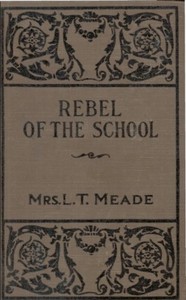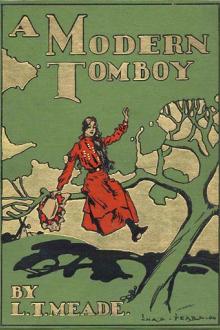The Rebel of the School, L. T. Meade [best historical biographies .txt] 📗

- Author: L. T. Meade
Book online «The Rebel of the School, L. T. Meade [best historical biographies .txt] 📗». Author L. T. Meade
"In future," said Kathleen very calmly, "now that I really know your views, I will always tell you home truths. You can't blame me, can you?"
Alice deigned no answer. She went downstairs and let herself out of the house.
"And that is the sort of girl I have exchanged for daddy and the mother and the boys," thought the Irish girl. "Oh, dear! oh, dear!"
Kathleen flew downstairs. It was nearly three o'clock; tea was to be on the table at half-past four. Quick as thought she dashed into the kitchen.
"Maria," she said, "and cook, is there anything nice and tasty for tea this evening?"
"Nice and tasty, miss!" said cook. "And what should there be nice and tasty? There's bread, and there's butter—Dorset, second-class Dorset—and there's jam (if there's any left); and that's about all."
"That sort of tea isn't very nourishing, cook, is it? I ask because I want to know," said Kathleen.
"It's the kind we always have at Myrtle Lodge," replied cook. "I don't hold with it, but then it's the way of the missis."
"I have got some money in my pocket," said Kathleen. "I want to have a beautiful, nice tea. Can't you think of something to buy? Here's five shillings. Would that get her a nice tea?"
"A nice tea!" cried Maria. "It would get a beautiful meal; and the poor missis, she would like it."
"Then go out, Maria; do, like a darling. I will open the door for you if anybody calls. Do run round the corner and bring in—Oh! I know what. We'll have sausages—they are delicious—and a little tin of sardines—won't they be good?—and some water-cress, and some shrimps—oh, yes, shrimps! Be quick! And we will put out the best tea-things, and a clean cloth; and it will rest the poor tired one so tremendously when she comes in and sees a good meal on the table."
Both cook and Maria were quite excited. Perhaps they had an eye to the reversion of the tea, the sausages, the sardines, the shrimps, and the water-cress.
Maria went out, and Kathleen stood in the hall. Two or three people arrived during Maria's absence, and Kathleen went promptly to the door and said, "Not at home, ma'am," in a determined voice, and with rather a scowling face, to these arrivals. Some of the visitors left rather important messages, but Kathleen did not remember them for more than a moment after they were delivered. Maria presently came back and the tea-table was laid. Kathleen gave Maria sixpence for the washing of an extra cloth, and the well-spread table looked quite fresh and wonderfully like a school-feast.
When Mrs. Tennant returned (she came in looking very hot and tired), it was to see the room tidy, Kathleen seated in her own special chair cobbling the boys' socks as hard as she could, and an appetizing tea on the table.
"What does this mean?" said Mrs. Tennant.
"It means," said Kathleen, jumping up, "that you are to plant yourself just here, and you are not to stir. Oh, I know you are dead tired. I will take off your shoes, poor dear; I have brought your slippers down on purpose, and you are to have your tea at this little table. Now what will you have? Hot sausages?—They are done to a turn, aren't they, Maria?"
"That they are, miss."
"A nice hot sausage on toast, and a lovely cup of tea with cream in it."
"But—but," said Mrs. Tennant, "what will Alice say?"
"Maria and I don't care twopence what Alice says. This is my tea, and Maria fetched it. Now then, dear tired one, eat and rest."
Mrs. Tennant looked at Kathleen with loving eyes.
"Did you buy these things?" she said.
"That she did, ma'am," cried Maria. "I never did see a more thoughtful young lady."
"My dear child," said Mrs. Tennant, "you are too good."
Kathleen laughed.
"If there is one thing I am, it is not that," she said. "I am not a bit good. I am as wild and naughty and——Oh, but don't let us talk about me. I am so hungry. You know I didn't much like your dinner to-day. I am not fond of those watery stews. Of course, I can eat anything, but I don't specially like them; so if you don't mind I will have a sausage, too, and a plateful of shrimps afterwards, and some sardines. And isn't this water-cress nice? The leaves are not quite so brown as I should like. Oh, we did have such lovely water-cress in the stream at home! Mrs. Tennant, you must come back with me to Carrigrohane some day, and then you will have a real rest."
Mrs. Tennant, feeling very much like a naughty child herself, enjoyed her tea. She and Kathleen laughed over the shrimps, exclaimed at the fun of eating the water-cress, enjoyed the sausages, and each drank four cups of tea. It was when the meal had come to an end that Kathleen said calmly:
"Three or four, or perhaps five, ladies called while Maria was out."
"Who were they, dear?"
"I don't know. They left messages, and I have forgotten them. One lady was dressed in what I should call a very loud style. She was quite old. Her face was all over wrinkles. She was stout, and she wore a short jacket and a big—very big—picture-hat."
"You don't mean," said Mrs. Tennant, "that Mrs. Dalzell has called? She is one of my most important friends. She promised to help me with regard to David's future. What did she say—can't you remember?"
"I am ever so sorry, but I can't. I kept staring at her hat all the time. I don't remember anything about her except that she was old and had wrinkles and a big picture-hat—the sort of hat that Ruth Craven would look pretty in."
Mrs. Tennant began to find the remembrance of her delightful tea a little depressing, for, question Kathleen as she might, she did not remember anything about the ladies except a few fugitive descriptions. As far as Mrs. Tennant could make out, people who were of the greatest importance to her had left messages, and yet none of the messages could be attended to.
"I can't even imagine who the other ladies can be," she said. "But as to Mrs. Dalzell, she must not be neglected; I must go out and see her at once."
"Then you will be more tired than ever, and I have not done a scrap of good."
"You meant very kindly, my dear child, and have given me a delicious and strengthening tea. Only don't do it again, darling, for it is my place to give you tea, not yours to give it to me."
CHAPTER VII. THE QUEEN AND HER SECRET SOCIETY.Mrs. Tennant had not been out more than a minute or two before David and Ben came in. Kathleen saw them from the window; she tapped on the window with her knuckles, nodded to them, kissed her hand, and looked radiant with delight. Some boys at the opposite side of the street saw her and burst out laughing. David's face grew red.
"I wish the little Irish girl wouldn't make us figures of fun," said Ben, speaking in an annoyed tone.
The next instant David had opened the door with his latchkey, and Kathleen was waiting for them in the hall.
"Sausages," she said, bringing out the word with great gusto, "and shrimps, and water-cress, and sardines, besides bread-and-butter galore, and nice hot tea. Maria is making fresh tea now in the kitchen. Come along in—do; you must be ravenous."
The boys stared at her. Ben forgot his anger; he was schoolboy enough to thoroughly enjoy the delicious meal which Kathleen had prepared.
When it came to an end David jumped up impatiently.
"Where are you going, Dave?" asked Kathleen in an interested voice. She wanted him to help her. She had hoped that he and she would go away to the old loft together, and talk as they had done the night before. But David was firm.
"I am going to the church," he said, "to practice on the organ. I only get the chance three times a week, and I must not neglect it."
"David hopes to be no end of a swell some day," remarked Ben. "He thinks he can make the instrument speak."
"And so can I," said Kathleen. "May I come with you, Dave?"
"Some day," he replied, looking at her kindly, "but not to-day. I'll be back as soon as I can."
David did not notice her disappointed face; he went out immediately, without even going upstairs first. Ben and Kathleen were now alone. Kathleen looked at him attentively.
"I wonder—" she said slowly.
"What are you staring at me for?" said Ben.
"I have been wondering what sort you are. I have got cousins at home, and they do anything in the world I like. I wonder if you would."
Ben had been very cross with Kathleen when she had knocked to him and David from the dining-room window, but he was not cross now. He was only thirteen, and up to the present no pretty girl had ever taken the slightest notice of him. He was a plain, sandy-haired boy, with a freckled face, a wide mouth, and good-humored blue eyes.
"You make me laugh whenever I look at you," was Kathleen's next candid remark.
"I didn't know that I was so comical," was his answer.
"Perhaps you don't like it."
"I can't say I do."
"Well, this is the Palace of Home Truths," said Kathleen, laughing. "I asked your darling, saintly sister just now which was the most wicked—to tell a polite lie, or a frightfully rude home truth. She said that a polite lie was an awful sin, so in this house I must cleave to the home truths. I could tell you, you know, that you have quite a fascinating smile, and a very taking voice, and a delightful and polished manner; but I prefer to tell you that you are comical, which means that I feel inclined to burst out laughing whenever I look at you."
"Thank you," said Ben, who could be very sulky when he liked. "Then I will take my objectionable presence out of your sight. I have got my lessons to do."
Kathleen raised her brows and gave a slow smile. Ben got as far as the door.
"Benny," she said then in a most seductive whisper.
He turned.
"I am so glad you are in."
"I should not have thought so."
"But I am. It is awfully lonely for a girl like me, who has got dozens of cousins at home, and uncles and aunts and all the rest of the goodly fry, to be stranded. I like David. I am quite smitten with David; and I like you, too. You can be a great friend of mine."
"Oh, I don't mind," said Ben.
He thought it would be very good fun to tell the other fellows about the charming Irish girl who liked him so much.
"I wonder if you'd help me, Ben."
"What can I do?" asked Ben.
"Sit down, and let's be cozy. I will sit in the tired one's chair, and you can sit on that little stool at my feet. Now isn't that nice?"
"Who do you mean by the tired one?"
"Your mother, silly boy, of course."
"It is a very ridiculous name to call her."
"It belongs to the Palace of Home Truths. Your mother is tired, and you—you lazy omadhauns—"
"Well, go on," said Ben. "I see by your manner that you want me to do something. I suppose it's something a little bit—a little bit not quite good."
"It is perfectly good. I'll love you ever so much if you will do it."
"What is it?"
"I am going out this evening. I may not be in until late. If the others are in bed, will you come and unlock the door for me when I throw gravel up at your window? You must tell me which is your window."
"I sleep in the north attic. It doesn't look out on to the street; and I can't—I can't possibly do it."
"You can come down and wait for me in the hall."
"How can I?"
"When the tired one goes to bed, you can come down. She goes to bed at ten, I know, and I shall not be in until about half-past ten. I don't want Dave to know—well, because I don't. I don't want Alice to know, because I dislike Alice very much."
"Really, Kathleen, you ought not to speak like that."
"Well, I do, and I can't help myself. Will you do what I want? Here, do you think you'd like this in your possession?"
As Kathleen





Comments (0)